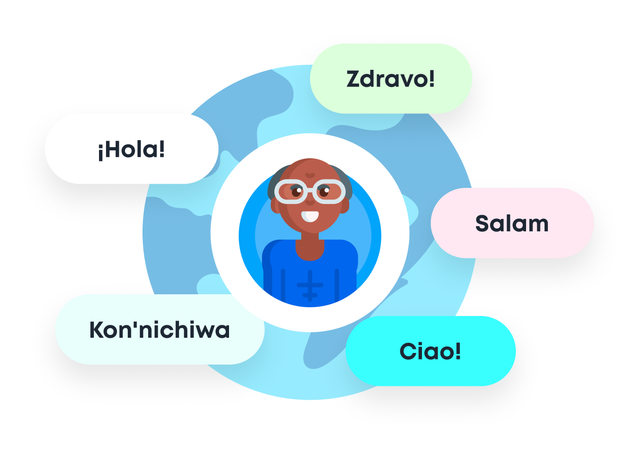“You can’t teach an old dog new tricks,” says the old guard, who unsurprisingly hasn't learned that this adage is nonsense. You see, in reality, you can learn new tricks no matter how old you get—19 or 90—and language is no different!
In fact, learning a foreign language at an older age opens up vast, new worlds of discovery, improves social connection, gives you an exciting purpose, and can even prevent cognitive decline.
But just because it’s possible and beneficial doesn’t mean it’s easy. Why is that? Why do children seem to acquire languages within a few years, while you have been hitting your head against Greek for the past decade?
Well, you’re in the perfect place to find out. In this guide, we’re going to answer the following exigent questions:
- Why is it harder to learn a language when you’re older?
- What are the benefits of learning a new language in your senior years?
- What is the scientifically proven best way to learn a language?
In other words, we’re going to show you how to overcome any barrier, both real and perceived, to master the foreign language of your choosing. So, stick with us and we’ll help you unlock an exciting new world—or several worlds—of discovery!
(And, if you're interested, here are a load of other popular language myths that could be holding you back.)
Hi! We’re Brainscape
We’re the brains, minds, and hearts behind the world’s smartest study app. And while we help learners study for all kinds of exams and professional certifications—from high school biology to the bar exam—we originally started as a language app!
So forgive me if I can't help but recommend Brainscape's smart language flashcards to help you to learn those pesky fundamentals like essential phrases, vocabulary, numbers, and verb conjugations TWICE as fast as other study methods.
Specifically, you can check out our certified Spanish, French, and Mandarin collections, which have been curated by our team of language experts. You can alternatively tour our Knowledge Genome to find other users’ flashcards for just about any other language on planet Earth. Or even Middle Earth. Or planet Qo'noS. (Nerds.)
And now for the answer to the question you’ve probably wondered since the day you decided to add another language to your repertoire: why is it harder to learn a language when you’re older?
Why is it harder to learn a language when older?
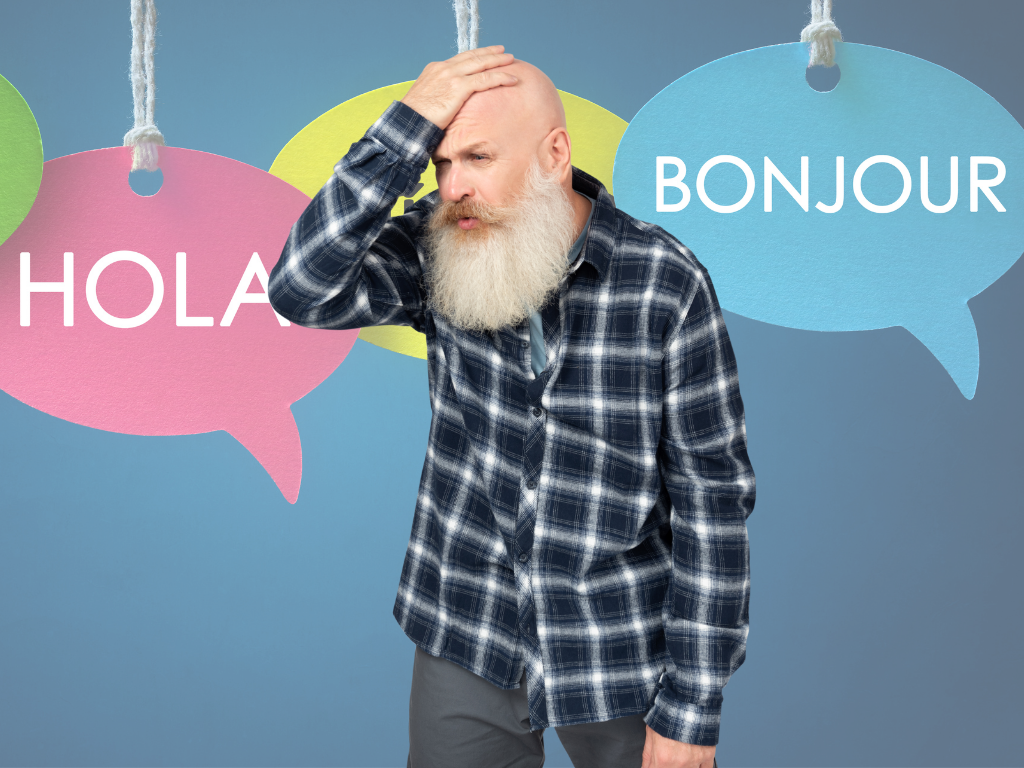
For starters, you’re not imagining things. It IS harder to learn a foreign language at an older age, and the older you get, the harder it becomes.
During one of the largest linguistics studies ever conducted—a viral internet survey that drew two-thirds of a million respondents—researchers from three Boston-based universities showed that the ability to learn a new language, at least grammatically, is strongest until the age of 18. After that sweet age, there is a precipitous decline.
Why’s that? I mean, if anything, as an adult, your ability to concentrate and understand things is far more sophisticated. So then why does your 14-year-old niece speak much better Spanish than you?
Social changes
The most obvious reason it’s harder to learn a language when you’re older is that, at 18, people tend to graduate from high school and either go to college, where they become too busy studying complex subjects and other extracurriculars to devote themselves to language learning ... OR they enter the workforce, which stacks their days with responsibilities.
As a high school student, you probably had the time, opportunity, and ideal learning environment in which to master a second language. As an adult, however, you had career-altering exams to study for; a job to get to; bills to pay; a home to keep; and maybe even a family to look after.
Now, as a senior, you once again have more time and freedom to study a language. But now your struggles are quite a bit different. (More on this in the third point below!)
Interference from one’s mother tongue
Another hypothesis for the steep decline in language learning ability is that the rules you learned to speak your native tongue are different to the rules you need to speak another language, and this can leave you super confused.
At Brainscape, we’re not too intimidated by this hypothesis. Sure, a new language can be confusing when its rules are so different from the ones you’re familiar with. But humans are fairly good at compartmentalizing things. (How else do you think we function with so much emotional baggage?) Also, you can actually USE your mother tongue to help you learn another language (check out that article if you’re interested to find out how!)
Changes in the brain

And finally, it’s thought that changes in the brain in the late teens and early 20’s could somehow make learning languages harder. While the exact mechanism for this isn’t known for younger people, what we do know is that, as we age, the brain becomes less “plastic”, which makes learning and, importantly, REMEMBERING, challenging.
Neuroplasticity is the brain’s ability to form new and restructure synaptic connections, mainly in response to learning or injury.
Allow me to explain. Each and every time you learn something new, your brain forms new neurons and neural pathways, while strengthening (or weakening) existing neural pathways. This never stops throughout your life but it is believed to decrease the older you get.
While (1) social changes, (2) interference from one’s mother tongue, and (3) changes in the brain can make second language learning more challenging, it’s still 100% doable. It just takes a bit of work.
And luckily, you have some incredible advantages at your fingertips nowadays. The abundance of language apps like Brainscape and free online resources are helping people of all ages learn their chosen tongue -- particularly as they hit retirement age and have more time and freedom to dedicate themselves to their studies.
The benefits of learning a new language in your senior years
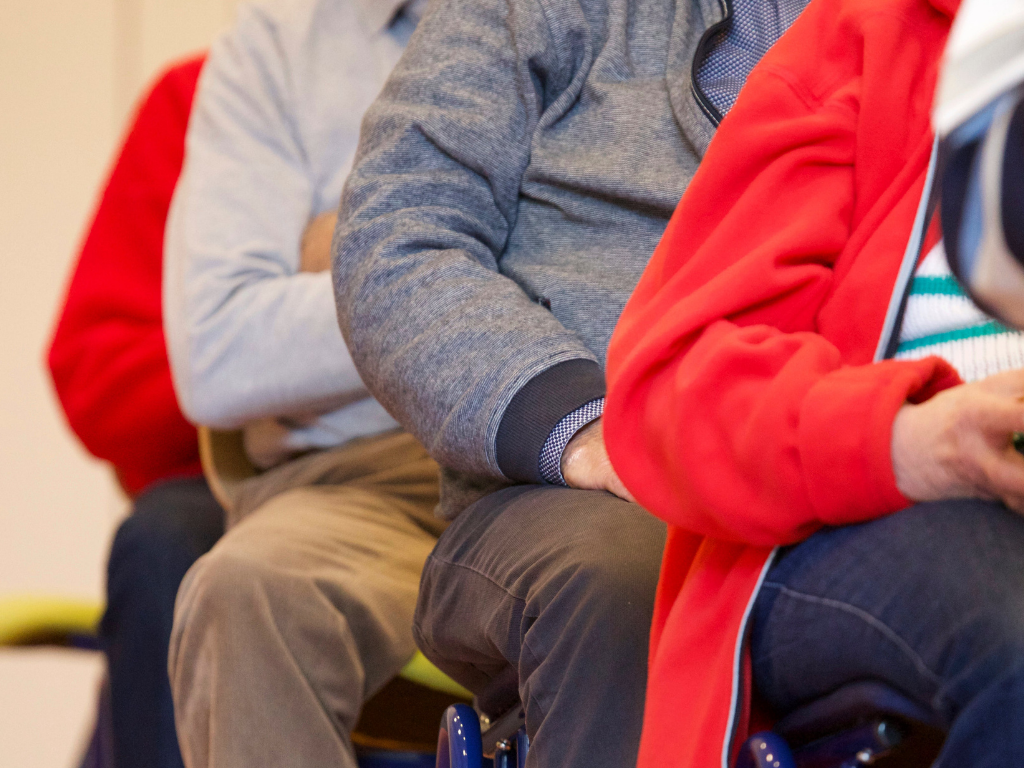
Now, let’s turn our attention to the benefits of learning a new language in your senior years because there are many. And some of them are truly life-changing ...
Learning a new language improves brain health
As I mentioned before, learning increases the plasticity of your brain and this preserves and even improves your cognitive health as you age.
How does it work? Well, switching from one language to the other activates areas of the brain responsible for executive functioning. And this decreases cognitive decline and can delay the initial effects of dementia.
Playing games like scrabble, crossword puzzles, jigsaw puzzles, strategic card games, and sudoku have similar benefits. But if you can get a whole new skill out of your time, why not devote it to language learning?
[For an even deeper dive into this subject, check out: The cognitive benefits of being multilingual]
Learning a foreign language improves social connection

Language is an important vehicle for communication between people and learning to speak a new one offers all kinds of opportunities to connect with others!
Story aside: The most isolated I ever felt was when I first moved to Chiang Mai, Thailand. Even though I was there with my partner, we had no friends and, unable to speak a stitch of Thai, little hope of changing that. So I started learning and before long, I was able to speak enough Thai to communicate my intentions or wants with the people around me. Even that little interaction—being able to return a greeting or a compliment, order food, ask for a price or barter—was enough to tremendously lift my spirits.
And so being able to speak a foreign language, and practice it daily with other speakers—whether they’re fellow students, a tutor, family, or the members of your community (if you live in a foreign country)—has a profound impact on your ability to feel connected and included. This, in turn, contributes enormously to the following …
Learning a foreign language is great for mental health
The mental health and happiness of older folks! Learning a new language in your senior years:
- Increases your social interactions,
- Gives you the ultimate skill for travel,
- Opens up new worlds of discovery through culture, art, and cuisine
- Provides you with a daily purpose
- Adds activities to your calendar (like lessons, conversational practice, watching foreign language films, going to festivals, etc.)
Now that you understand all of the delectable advantages to acquiring a new language, irrespective of age, let’s give you the tools you need to fast-track your learning journey!
The scientifically proven best way to learn a language

[Check out: The best way to learn a language online—your complete toolkit]
Get motivated
The best way to learn a language fast is to have the motivation necessary to do so. Most people “like the idea” of learning a language but then drop out after a few weeks or months because of the demands on their time and effort.
To learn a new language effectively, you need to be powerfully motivated to do so, and nothing motivates the brain more than having language be a barrier to communication. Think about it: how much more enthusiastic will you be to “hit the books” if you desperately want or even need to:
- Understand a restaurant menu,
- Ask for directions to important places, like a bathroom, gas station, or grocery store,
- Read road signs and other directions,
- Ask for and negotiate prices at a market, and, perhaps most importantly:
- Make friends with locals!
So, how can you make yourself desperately dependent on a new language in order to do these things? Immerse yourself!
Immerse yourself in the language
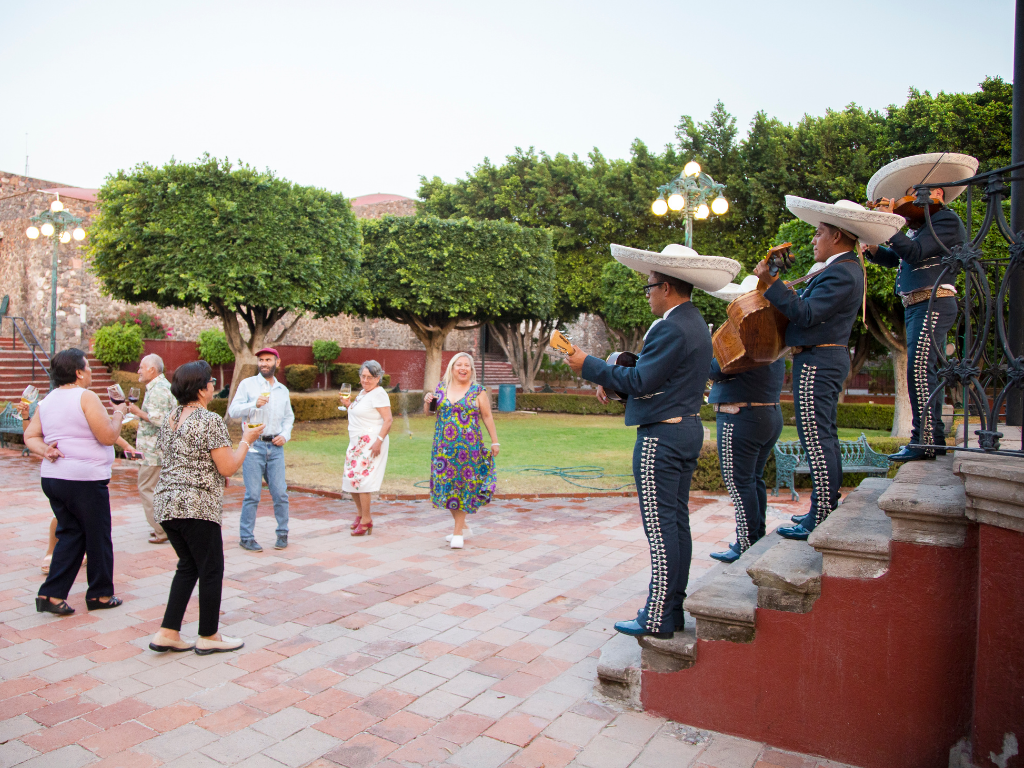
According to an article published in Scientific American: “People who learned via immersion—living in a foreign language-speaking country more than 90 percent of the time—were significantly more fluent than those who learned in a class.”
In other words: spend three months in, for example, a tiny Italian village where they speak little to no English and you’ll return with a decent grip of the language; provided you’re socializing daily with people.
Oh yes, it’s uncomfortable at first, and you’ll grow tired of people’s confused faces, but within weeks you’ll have the basic greetings down; within a month you’ll be able to order what you want off menus and from markets. And within three months you will be able to hold a basic conversation: you could take years of language instruction and never achieve the same fluency!
Failing this tactic of moving to (or spending a few months in) a foreign country, join a community of foreign language speakers and meet up with them as often as you can. Get online and chat to other speakers. Read books and watch films (without subtitles, if you can). And dedicate several hours per day to immersing yourself in the language.
If you put your brain in these types of situations, it will be primed to learn and pick up on words, phrases, and pronunciation much faster.
Repetition is key

The whole reason immersion is the scientifically proven best way to learn a language is that it puts you in an environment where you’re forced to practice greetings, vocabulary, verb conjugations, questions, numbers, pronunciation, and other aspects of the language again and again and again and again until you understand and you are understood.
So, really the scientifically proven best way to learn a language is repetition! And spaced repetition at that. In other words: repeating a word or concept over and over at spread-out intervals so that it becomes a permanent part of your memory bank.
You know the feeling: a phrase you struggle with at the beginning of your learning journey starts to become more and more comfortable, until one day, you find yourself firing it off without even thinking!
What’s the best way to do all this?
Use Brainscape!
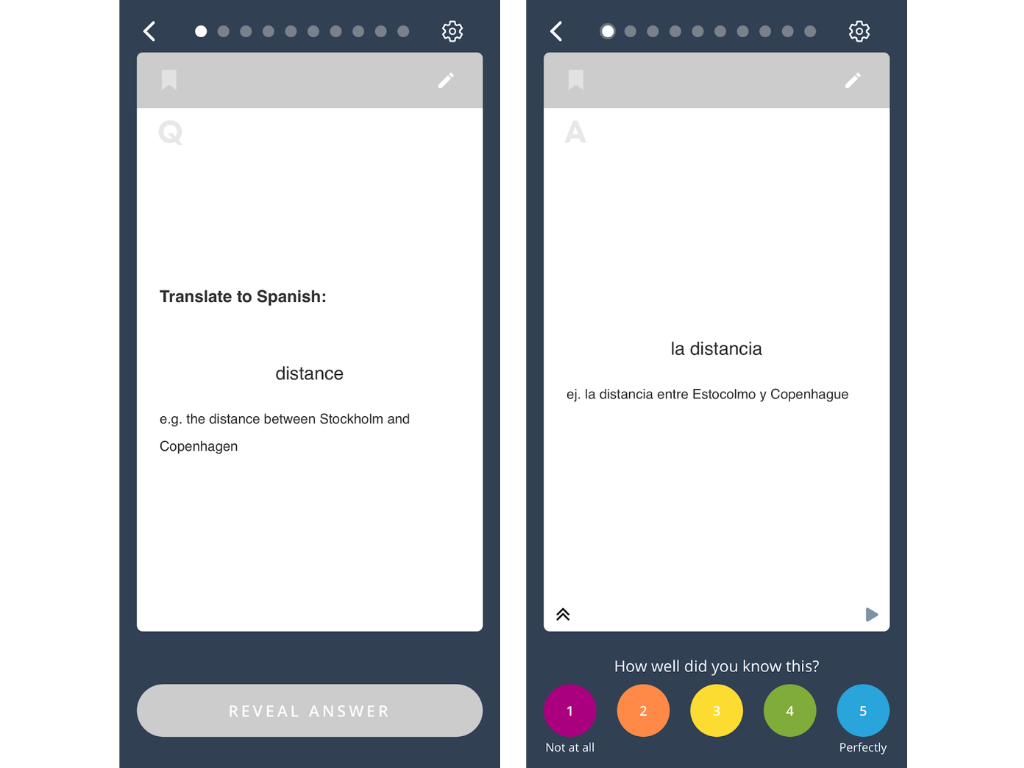
Brainscape is scientifically proven to help people learn new concepts twice as fast as traditional study techniques. Our adaptive flashcards break down vast subjects like languages into their composite building blocks, which they then deliver to you in a way that is specifically tailored to your pace of learning.
Spaced repetition is built into our app so by simply opening your phone, tablet, or laptop, you can study in the most efficient way possible. Also, let’s not forget how incredibly convenient it is to be able to study on any device, anytime, and anywhere you go!
By eliminating the barriers to learning, Brainscape is a powerful ally to your language learning, enabling you to master new vocabulary, verb conjugations, and essential phrases (and listen to and practice their pronunciation) throughout your day.
“Memory is very slow and slippery, and it gets increasingly difficult with every passing year. We seniors are very aware and concerned about remembering things. Brainscape is super for helping us remember our vocabulary.” — Svami Chityananda (68) Sanskrit learner and the inspired mind behind www.quietkarma.org
We deep-dive the science behind Brainscape in this guide—How brain science can help you learn a language faster—so I really encourage you to check it out if you’re interested!
Small talk is talk, too!
So many people focus on trying to become totally fluent in a language—to the point where they can engage in deep conversations with locals—that they forget to be excited about being able to do “the BIG little things”, like ask someone how they are, order exactly what they want off a menu, or ask for directions to the nearest grocery store.
If you’re mindful of the small accomplishments, which really make life SO much easier, then every day will be peppered with wonderful victories. And that will provide you with the motivation to keep at it.
Practice speaking aloud as much as possible
One of the challenges people face when mastering a new language is getting the accent and pronunciation right. Some people are naturally gifted at mimicry, while others find it incredibly hard to bend their tongue around certain words and sounds. The consequences of this are sounding unintelligible to those you’re trying to communicate with.
While you may never sound like a native speaker, you can, with out-loud practice and dogged repetition, get your pronunciation and accent right. It also helps to do this practice with a recording or another speaker who can correct your pronunciation.
Pro Tip: Brainscape’s flashcards contain the correct audio pronunciation of each term posed to you so that you can get it right!
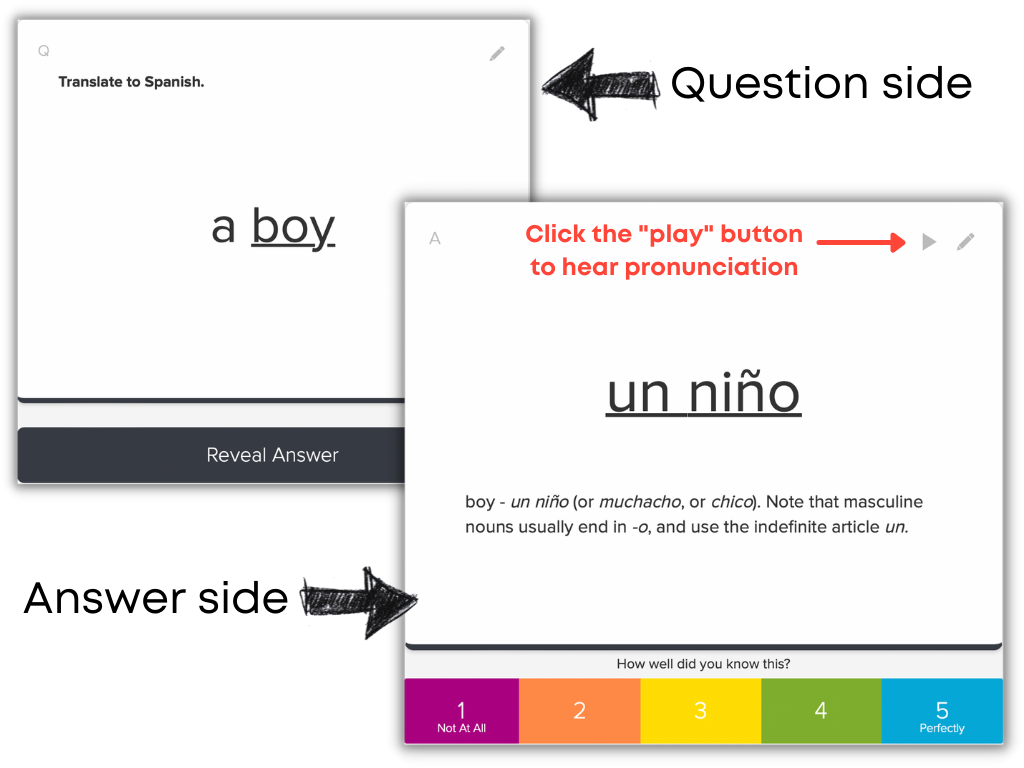
Also, remember, just about every person you attempt to communicate with will likely be patient and understanding; they may even be excited to hear you attempt their language!
During my two-year stay in Thailand, whenever I greeted someone in Thai, their face would light up like a sunrise. My pronunciation was probably horrible but they were charmed that I, a farang (foreigner), cared enough to try to learn their language.
And if someone does laugh at you? They’re probably just having a chuckle at your boo-boo, which doesn’t matter one bit in the scheme of things.
Be bold and enjoy the journey

The final thing I’d like to leave you with is this ...
One of the chief differences between children who are learning a language and adults is that adults tend to be impatient and easily discouraged when they don’t grasp things right away, and feel the sting of ego when they make a mistake. Children, on the other hand, will happily make mistakes until they get it right.
The take-away from this is simple. Be brave and forge ahead even when you get things wrong: especially if you get things wrong because YOU WILL. That’s the deal with learning. You do it over and over until you get it right.
So take the advice provided in this language guide and get Brainscape in your corner, so that you can rise to the challenge of your chosen language!
Other useful reads:
- The best way to learn a language online—your complete toolkit
- The cognitive benefits of being multilingual
- How brain science can help you learn a language faster
References
Alzheimer’s Research UK. (2024, March 4). Speaking a second language shows benefits in Alzheimer’s - Alzheimer's Research UK. https://www.alzheimersresearchuk.org/news/speaking-second-language-shows-benefits-alzheimers/#:~:text=The%20scientists%20also%20found%20that,occurring%20due%20to%20Alzheimer's%20disease.
Barber, K. (2024). Can language learning support your mental health? Education First. https://www.ef.edu/blog/language/language-learning-mental-health/#
Derakhshan, A., & Karimi, E. (2015). The interference of first language and second language acquisition. Theory and Practice in Language Studies, 5(10), 2112. https://doi.org/10.17507/tpls.0510.19
Hartshorne, J. K., Tenenbaum, J. B., & Pinker, S. (2018). A critical period for second language acquisition: Evidence from 2/3 million English speakers. Cognition, 177, 263–277. https://doi.org/10.1016/j.cognition.2018.04.007
Li, P., Legault, J., & Litcofsky, K. A. (2014). Neuroplasticity as a function of second language learning: Anatomical changes in the human brain. Cortex, 58, 301–324. https://doi.org/10.1016/j.cortex.2014.05.001
Smith, D. G. (2024, February 20). At what age does our ability to learn a new language like a native speaker disappear? Scientific American. https://www.scientificamerican.com/article/at-what-age-does-our-ability-to-learn-a-new-language-like-a-native-speaker-disappear/
Van Der Ploeg, M., Keijzer, M., & Lowie, W. (2023). Language learning, motivation, and well-being in later life. Social Sciences & Humanities Open, 8(1), 100749. https://doi.org/10.1016/j.ssaho.2023.100749
